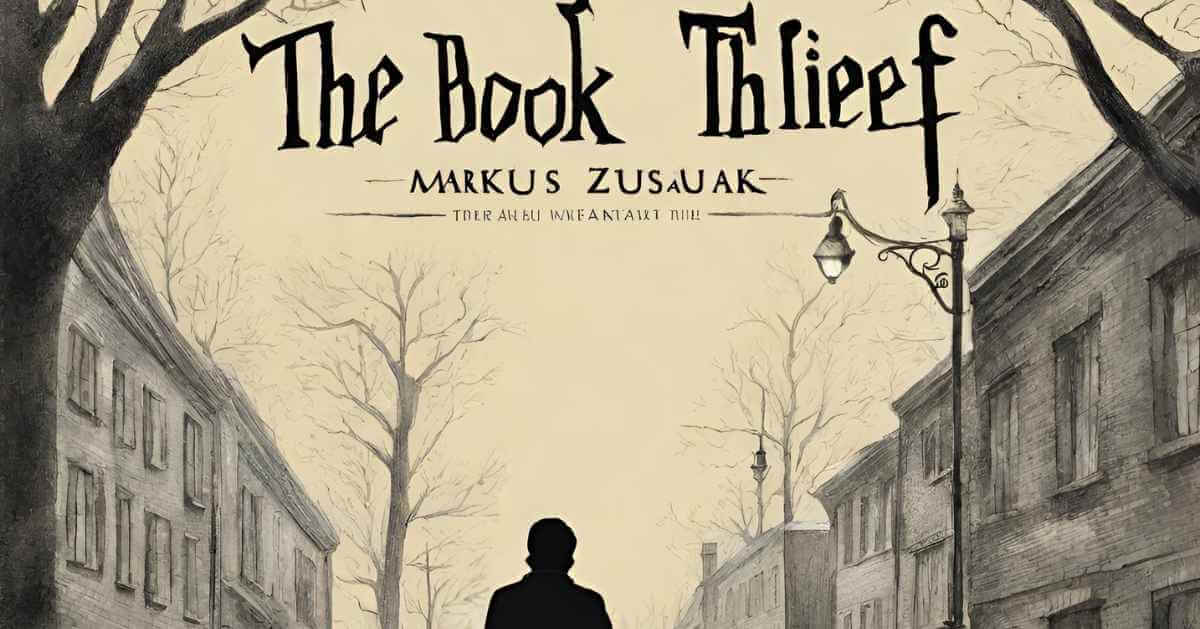“The Book Thief” By Markus Zusak: Summary, Themes and Characters

“The Book Thief,” written by Australian author Markus Zusak in 2006, transports readers to Nazi Germany during World War II. This internationally acclaimed historical fiction became a sensation, translated into 63 languages and selling over 17 million copies. Its cinematic adaptation in 2013 further amplified its reach.
At its core, the novel traces the journey of Liesel Meminger, a young girl navigating the tumultuous era. Uniquely narrated by Death, the story unveils the perspectives of war’s numerous victims. Themes of mortality, the power of literature, and the resilience of love weave throughout this compelling narrative.
The Book Thief: Summary
“The Book Thief” book summary is a poignant historical fiction novel by Markus Zusak, published in 2006. Set in Nazi Germany during World War II, the story revolves around Liesel Meminger, a young girl grappling with the harsh realities of the time.
Narrated by Death, the novel provides a unique perspective on the lives and experiences of those affected by the war. Liesel, the protagonist, is fostered by Hans and Rosa Hubermann after the death of her younger brother and separation from her mother. Despite the challenging circumstances, Liesel finds solace in stealing books and sharing them with others, discovering the transformative power of words.
The narrative is enriched by Liesel’s relationships with various characters, including her best friend Rudy Steiner and Max Vandenburg, a Jewish man hidden in the Hubermanns’ basement. The characters grapple with the oppressive atmosphere of Nazi Germany, and their lives are profoundly impacted by the war.
Throughout the novel, Death reflects on humanity’s capacity for both cruelty and kindness. The themes of death, literature, and love are interwoven into the fabric of the story, creating a powerful and emotionally resonant narrative.
“The Book Thief” summary explores the enduring human spirit in the face of adversity and highlights the redemptive and transformative power of literature. With its unique narrative style and compelling characters, the novel has captivated readers worldwide and continues to be celebrated for its exploration of the profound impact of words in the darkest of times.
[You can Also Read: The Glass Castle: A Detailed Summary of the Story]
The Book Thief: Characters
Certainly! Here are some of the key characters from “The Book Thief”:
- Liesel Meminger: The protagonist, is a young girl sent to live with foster parents, the Hubermanns, during World War II. She develops a love for books and reading, which becomes a central part of her life.
- Hans Hubermann: Liesel’s foster father, a kind-hearted and talented accordion player. He forms a close bond with Liesel and teaches her to read.
- Rosa Hubermann: Liesel’s foster mother, who initially appears stern and abrasive but has a caring side that she keeps hidden. She develops a strong affection for Liesel despite her tough exterior.
- Max Vandenburg: A Jewish man who seeks refuge in the Hubermanns’ basement. He forms a close relationship with Liesel and shares a love for storytelling and literature.
- Rudy Steiner: Liesel’s best friend, known for his loyalty and love for sports, particularly track and field. He develops romantic feelings for Liesel.
- Death: The narrator of the story, provides an omniscient perspective on the events and characters, and often reflects on the nature of humanity and mortality.
- Ilsa Hermann: The mayor’s wife who allows Liesel access to her extensive library. She becomes an important figure in Liesel’s life, encouraging her love for books.
These characters, each with their unique traits and backgrounds, play pivotal roles in shaping Liesel’s experiences and the overall narrative of the novel.
The Book Thief: Themes
“The Book Thief” delves into several profound themes that resonate throughout the narrative:
- Death and Mortality: The omnipresence of death is a central theme, narrated by Death itself. It explores mortality, loss, and the inevitability of death during wartime.
- Power of Words and Literature: Liesel’s relationship with books and the written word illustrates the transformative power of literature. It highlights how words can offer solace, inspire, and even influence perceptions in challenging times.
- Resilience and Survival: Amidst the devastation of war, the characters display resilience in their efforts to survive and maintain their humanity. It showcases the strength of the human spirit in the face of adversity.
- Humanity and Compassion: The novel portrays instances of compassion, kindness, and sacrifice even in the darkest of times. It emphasizes the importance of empathy and humanity in a world torn apart by conflict.
- Guilt and Redemption: Characters grapple with guilt and seek redemption for their actions or inactions. This theme explores the complexities of morality and the pursuit of forgiveness.
- Loss and Grief: The story navigates through themes of loss and grief, portraying how individuals cope with the absence of loved ones and the emotional aftermath of war.
These themes interweave, offering a poignant exploration of the human condition within the backdrop of a tumultuous historical period.
[You can Also Read: Sense and Sensibility Overview, Characters, and Key Facts]
Conclusion
“The Book Thief” intricately weaves the power of words, resilience, and compassion in Nazi Germany. Through Liesel’s journey, loss, and acts of defiance, Markus Zusak crafts a moving narrative. Death’s unique narration offers profound insights, leaving readers with a deep appreciation for the enduring strength of the human spirit during tumultuous times.
